Smoke Gets in Your Eyes
Smoke Gets in Your Eyes
"Smoke Gets in Your Eyes" is from Kern's musical Roberta, his last big Broadway venture. Based on the Alice Duer Miller novel “Gowns by Roberta,” it is a sophisticated comedy about an American football player and a Russian princess. The song that carried the show was "Smoke Gets in Your Eyes," which, in earlier incarnations, had been intended as a fast tap dance number in Show Boat, then as a march for an NBC radio series. It was lyricist and librettist Otto Harbach's idea to slow the song down and to add a lyric based on an old Russian proverb. Beautiful Ukranian-born Tamara Drasin was chosen to play the part of Princess Stephanie and to sing "Smoke Gets in Your Eyes," and it is she who we hear on this recording. In the show Tamara accompanied herself on guitar, but on this recording she is accompanied by a dance orchestra. Since Harbach's staging called for a jazz band onstage, the dance band accompaniment may not be totally out of place here.
Smoke Gets in Your Eyes
With music by Jerome Kern, lyrics by Otto Harbach, and starring Bob Hope, 'Roberta' became one of the most popular Broadway musicals from the 1930s. Its success came in the early and worst years of the depression when poor box office receipts were mercilessly closing most shows. So well did 'Roberta' go over, in fact, that it was brilliantly adapted to the screen in 1935 in a version starring Fred Astaire and Ginger Rogers.
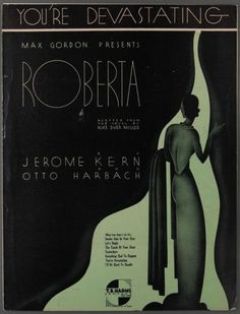
Jerome Kern, Otto Harbach - Roberta 1933
Jerome Kern (1885-1945) is arguably the father modern American musical theater. Born in New York of German heritage, he attended the New York College of Music and began to break into Broadway theater during the first decade of the century by having songs of his interpolated into shows. Kern really entered the history books with “Show Boat”(1927), the first truly modern American musical, with an integrated story and such memorable songs as "Ol' Man River" and "Can't Help Lovin' Dat Man."
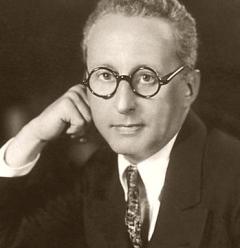
Jerome Kern
Like many of his contemporaries, Kern divided his time between Broadway and Hollywood in the '30s, after sound came into the movies. Music composed by Jerome Kern has been popular with jazz artists for so long it's hard to imagine how horrified Kern was by the liberties jazz interpreters took with his finely-crafted melodies. Kern worked steadily -- he wrote or contributed to 37 shows during his career -- and was beginning work on Annie Get Your Gun when he died suddenly in 1945. He left behind one of the richest catalogs of show music in history.
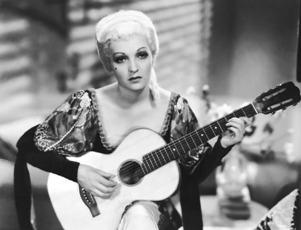
Tamara Drasin
Born in Salt Lake City, in 1873, Otto Harbach studied at the Collegiate Institute, then at Knox College before becoming an English professor. He was on the staff of Whitman College from 189 5-1901, then moved to New York. Harbach met composer Karl Hoschna and the two became a songwriting team, scoring their first hit with 1908's "Cuddle Up a Little Closer," from their score for Broadway's ‘The Three Twins.’ The duo collaborated on more successful shows until Hoschna's death in December 1911. After Hoschna was gone, Harbach began working with composer Rudolf Friml. In 1920, Harbach teamed up with another lyricist-librettist, Oscar Hammerstein II, for the most successful period of Harbach's career.
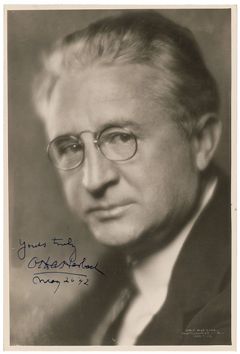
Otto Harbach
Besides his three main collaborators, Harbach also wrote with many others over the years, including Herbert Stothart, Vincent Youmans, George Gershwin, Sigmund Romberg, and Jerome Kern. Some of Harbach's best-known songs are "Every Little Movement" (1910), "Sympathy" (1912), "The Love Nest" (1920), "Rose-Marie" (1924), "The Desert Song" (1926), "Yesterdays" and "Smoke Gets in Your Eyes," (1933). Many of the musicals that Harbach worked on were later turned into movies.
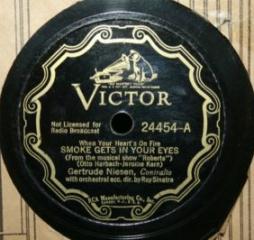
Gertrude Niesen - Smoke Gets In Your Eyes, 1933
Eighty three years ago - in January 1934 - Paul Whiteman and his Orchestra had the Number One record in America. And 58 years ago - that would be January 1959 - the Platters had the Number One record in America.
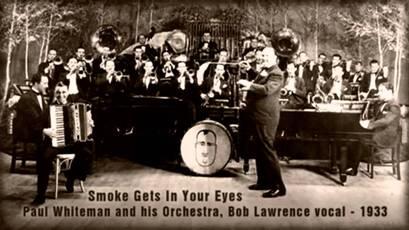
Paul Whiteman and his Orchestra
"Smoke Gets in Your Eyes" undertook an interesting journey before reaching the Platters. After the song made its debut in the 1933 musical Roberta, the composition was released as a single later that year by Gertrude Niesen. Two years later it appeared in the 1935 movie adaptation, this time performed by Irene Dunne. The 1952 remake found Kathryn Grayson performing the ballad, and her operatic voice beautifully graced the song's lovely melody. But the Platters' take represents a change in sound, when a more unrestrained approach courtesy of R&B found its way to popular music.
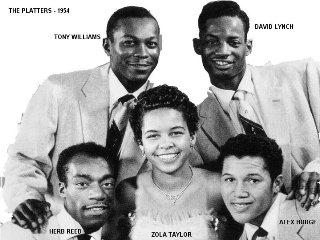
The Platters
Their version is truly marvelous, thanks in large part to Tony Williams' rich lead vocal and arranger David Carroll's lush orchestration. The group's exquisite harmonies inject doo-wop into the ballad, thereby modernizing the Broadway tune. But it's Williams' intense performance that transforms "Smoke Gets in Your Eyes" into something more, a torch song oozing longing and sensuality. His voice dips and soars, alternates in tone and volume, dramatizing the lyrics. As Williams' voice reaches a crescendo at the song's end, his passion emanates through the speakers, releasing both the agony and ecstasy that previous versions do not reveal.
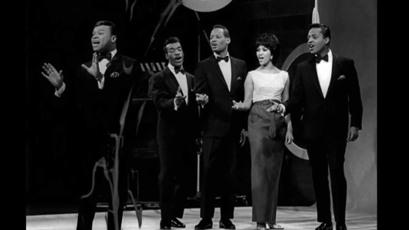
The Platters sing Smoke Gets in Your Eyes
When the group was inducted into the Rock and Roll Hall of Fame in 1990, the museum cited the Platters for best representing a "golden era when pop, rhythm & blues and rock and roll flowed together in perfect harmony." Indeed, the Platters effectively bridged these genres.
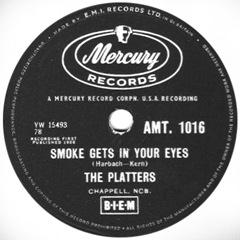
The Platters - Smoke Gets in Your Eyes, Mercury 1958
This is the song at its pop pinnacle, but it also works very well with jazz singers and instrumentalists, the first being Paul Whiteman and his Orchestra, with a vocal performance from Bob Lawrence. Other early covers of the song include that of the Tommy Dorsey orchestra, who released their contemporary version in 1938, with His Master's Voice. During the mid-to-late 1930s Larry Adler and Henry Hall recorded live radio performances of the song on BBC Radio broadcasts. Art Tatum performed "Smoke Gets in Your Eyes" in the 1930s, contributing to the song's popularity. However, it is unclear whether Tatum recorded the song during that decade.
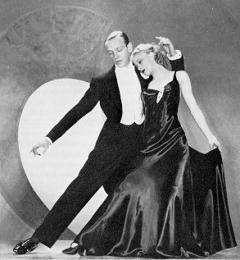
Fred Astaire and Ginger Rogers - Roberta, 1935
In 1941 the Benny Goodman Orchestra first performed the song during recorded radio performances with Helen Forrest, then began performing the song with her replacement Peggy Lee. Glenn Miller conducted his rendition of the song at Abbey Road Studios in 1944. Owing to his sudden death later that year, his orchestral version of the song was not released until 1995. On October 30, 1946 Nat "King" Cole recorded the song, with Oscar Moore playing guitar and Johnny Miller playing bass as the King Cole Trio.
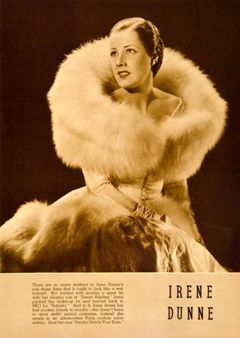
Irene Dunne
In 1950 Charlie Parker and Jo Stafford each released versions of the song on their respective albums, Bird at St. Nick's and Autumn in New York. Thelonious Monk released the song in 1954 on his album Monk. On his 1955 album Clifford Brown with Strings, Clifford Brown released a cover of the song. Dinah Washington released the song in 1956, on her album Dinah!. In 1958 Sarah Vaughan released her rendition on her album, No Count Sarah. In 1961 Cannonball Adderley released the song on his album African Waltz. Bandleader Ray Conniff first released his arrangement of the song in 1962, on his double album The Ray Conniff Hi-Fi Companion; it became one of the signature songs of his career.
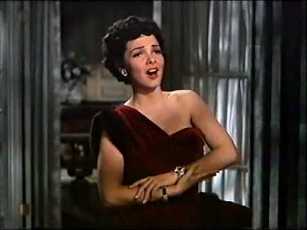
Kathryn Grayson
It was an odd song for 1959. But then it was an odd song for 1934. "Smoke Gets In Your Eyes" isn't one of those "timeless" ballads, like "It Had To Be You" or "My Funny Valentine". It sounded old even when it was new. Even 80 years ago, it didn't talk the way pop songs were meant to talk. Nevertheless, it lives on in all of its numerous versions as a wonderfully romantic song that sounds like falling in love itself.
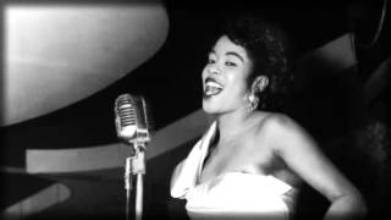
Sarah Vaughan sings Smoke Gets In Your Eyes
Smoke Gets In Your Eyes lyrics
They asked me how I knew My true love was true Oh, I of course replied Something here inside cannot be denied They said someday you'll find All who love are blind Oh, when your heart's on fire You must realize Smoke gets in your eyes So I chaffed them and I gaily laughed To think they could doubt my love Yet today my love has fade away I am without my love Now laughing friends deride Tears I can not hide Oh, so I smile and say When a lovely flame dies Smoke gets in your eyes Smoke gets in your eyes
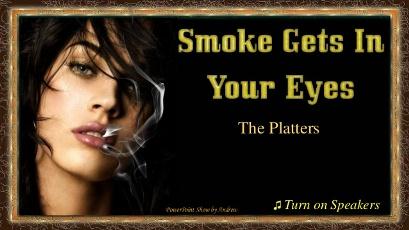
Smoke Gets In Your Eyes








